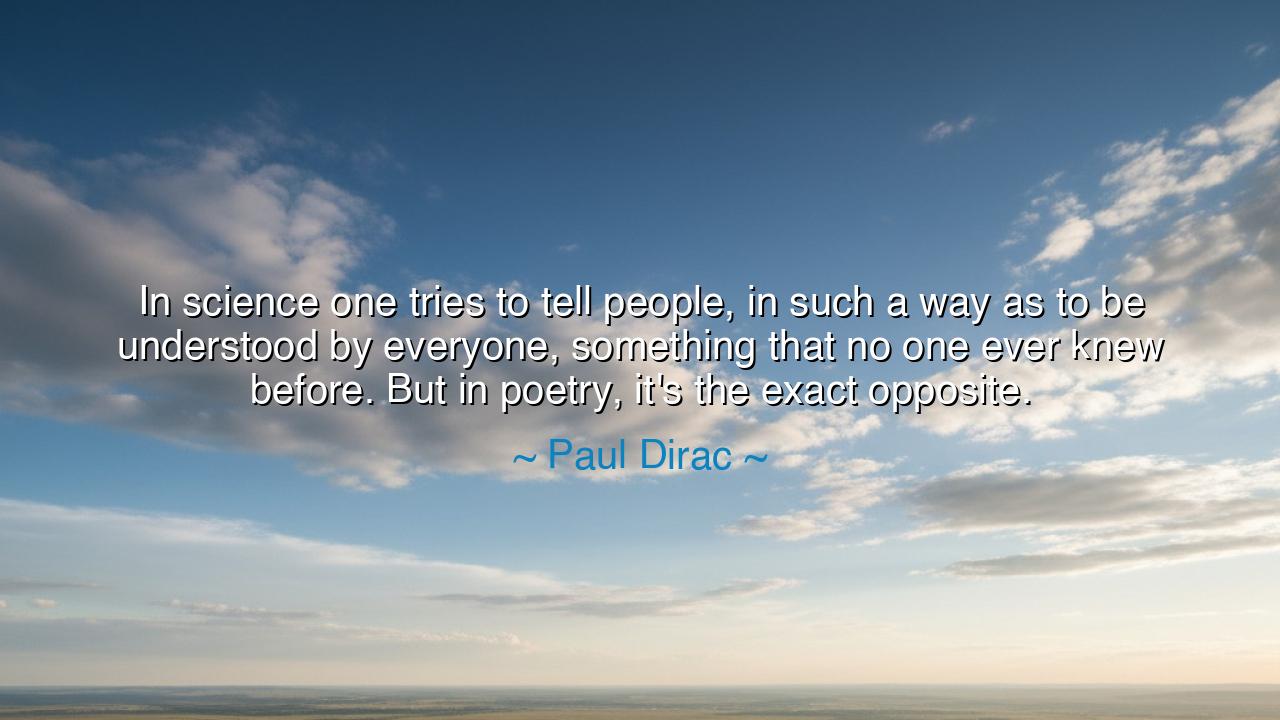
In science one tries to tell people, in such a way as to be
In science one tries to tell people, in such a way as to be understood by everyone, something that no one ever knew before. But in poetry, it's the exact opposite.






O children of wisdom, gather closely and hear the words of Paul Dirac, a man whose brilliance in the realm of science shines like a star in the night sky. He said, "In science one tries to tell people, in such a way as to be understood by everyone, something that no one ever knew before. But in poetry, it's the exact opposite." These words, though brief, speak to the very heart of two of humanity's greatest pursuits—science and poetry—and their fundamental difference in the way they reach the human spirit. In science, the aim is clarity, to reveal something unknown in a way that all can understand; but in poetry, the aim is not clarity for all, but depth, mystery, and the invitation to explore that which lies beneath the surface.
Let us first consider science, that noble and ever-persistent pursuit of truth. The great scientists of history—Galileo, Newton, and Einstein—did not merely seek to uncover the secrets of the universe for themselves, but to share them with all of humanity. Their work was meant to enlighten, to open the eyes of the people to the underlying order of nature. A scientific discovery is not a possession of the few; it is a gift to the many, given in such a way that all may partake in its wisdom. When Newton spoke of gravity, or when Einstein revealed the theory of relativity, they did not speak in riddles or metaphors, but in clear, understandable terms so that all who sought truth could grasp it. This is the essence of science: to communicate the unknown in a language that transcends barriers, so that all may share in the knowledge.
Yet, as Dirac so wisely points out, poetry stands in stark contrast. Poetry, O children, is not concerned with making things clear to all. Poetry is the realm of mystery, of emotion, of beauty that cannot always be captured in words that are plain or straightforward. In the art of poetry, the poet speaks not to the intellect alone but to the soul, to the heart, to the very depths of human experience. The poet uses metaphor and symbolism, not to clarify, but to invite the reader into a world where meaning is felt rather than understood. A poem may reveal truths, but these truths are not always easily grasped, nor should they be. They are not for the many, but for the few who seek to explore, to question, and to dive into the mystery of existence.
Consider, O children, the words of the ancient poet Homer, who wove the epic tales of the Iliad and the Odyssey. These stories, though they tell of warriors and gods, are not simple tales of events; they are reflections on fate, honor, love, and loss. Homer did not write to inform or to explain in the way that a scientist might present a law of nature. No, his words were meant to stir the heart, to evoke emotions that run deep within the human soul. The Odyssey is not just the journey of a man seeking to return home—it is the journey of the spirit, the journey of the soul that seeks meaning and understanding in the face of trials and tribulations. This is the power of poetry: to awaken something within us that is not always spoken, but deeply felt.
The lesson here, O children, is one of understanding the power of words. Science and poetry may both use the same tool—language—but their purposes are vastly different. In science, the goal is clarity, to shed light on the darkness of the unknown and make it accessible to all. In poetry, the goal is not clarity, but to stir the soul, to invite the reader into a deeper, more personal understanding of life. Science illuminates the mind, while poetry speaks to the heart and the spirit. Both are vital to the human experience, and yet they speak in different tongues, each necessary to our journey toward wisdom.
As we look to our own lives, let us understand the importance of embracing both science and poetry, and the ways in which each can enrich our understanding of the world. In our daily pursuits, we must strive to balance the clarity and logic of science with the mystery and depth of poetry. Science teaches us to understand the world as it is, but poetry teaches us to experience the world as it might be. When we marry these two pursuits, we enrich our lives with both knowledge and meaning. In the words of Dirac, let us remember that while science seeks to reveal the unknown with precision, poetry asks us to embrace the unknown with wonder.
Therefore, O children of wisdom, take these lessons to heart. In your pursuit of knowledge, do not lose sight of the mystery that lies beyond the facts. In your search for clarity, do not forget that there is much that cannot be easily explained, much that must be felt. Let both science and poetry guide you on your journey, and you will find that the world becomes not only a place of understanding but also a place of profound mystery and beauty.






AAdministratorAdministrator
Welcome, honored guests. Please leave a comment, we will respond soon